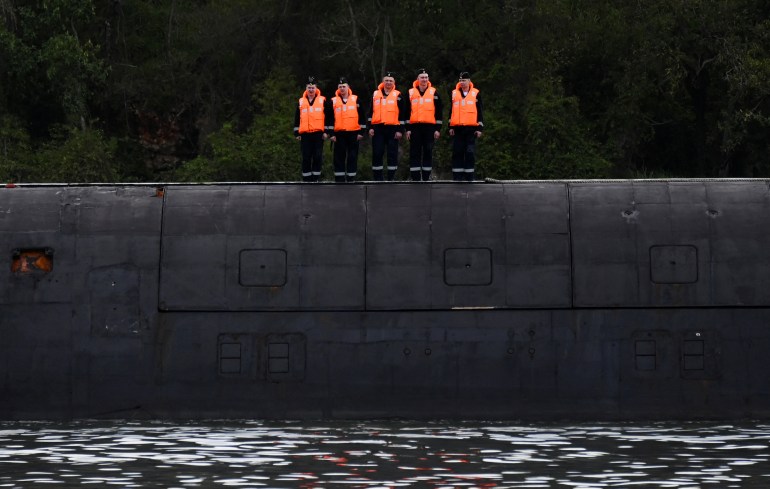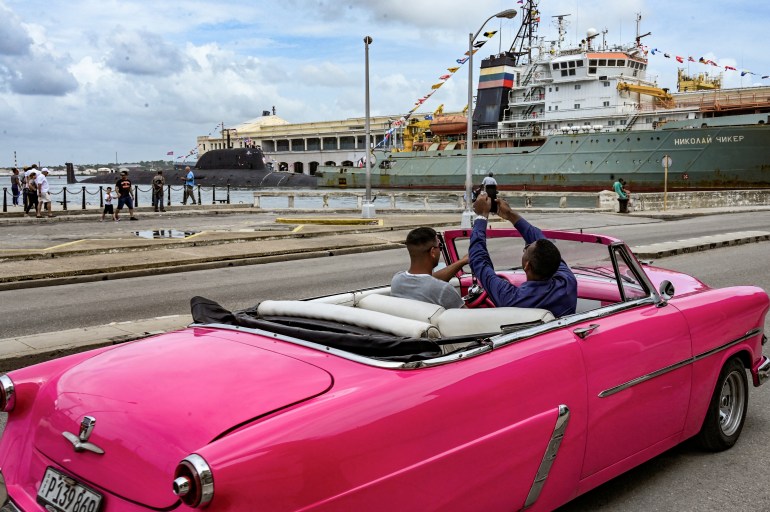US downplays deployment, which comes amid rising tensions over Russia’s full-scale invasion of Ukraine.
Russia’s Admiral Gorshkov frigate and the nuclear-powered submarine Kazan, accompanied by a tug boat and a fuel ship, have arrived in Cuba for a five-day visit seen as a show of force by Moscow amid rising tension over its invasion of Ukraine.
Curious onlookers, fishermen and police gathered along the Malecon seafront boulevard in Havana to welcome the fleet as it entered the city’s harbour on Wednesday.
Cuba, a longtime ally of Russia, saluted the vessels’ arrival with a 21-gun salute, while Russian diplomats waved small Russian flags and took selfies against a backdrop of the harbour’s historic fortresses.
The four Russian vessels conducted “high-precision missile weapons” training in the Atlantic Ocean while on their way to Cuba. The submarine and frigate are equipped with Zircon hypersonic missiles, Kalibr cruise missiles and Onyx antiship missiles, the Russian Ministry of Defence said.
The unusual deployment of the Russian navy so close to the United States comes after Washington and some of Ukraine’s other Western allies allowed Kyiv to use their weapons on targets inside Russia amid a renewed Russian assault on northeastern Kharkiv and battle troop and ammunition shortages.
Havana lies just 160 kilometres (100 miles) from Key West in the southern state of Florida where the US has a naval air station.
“The warships are a reminder to Washington that it is unpleasant when an adversary meddles in your near abroad,” Benjamin Gedan, director of the Latin America programme at the Washington, DC-based Wilson Center think tank, told The Associated Press news agency, referring to Western involvement in Russia’s war in Ukraine.
“It also reminds Russia’s friends in the region, including US antagonists Cuba and Venezuela, that Moscow is on their side,” he said.

Cuba said last week that the visit was standard practice by naval vessels from countries friendly to Havana and that the fleet was not carrying nuclear weapons.
The US, which has been monitoring the vessels, has also played down the deployment.
White House National Security Adviser Jake Sullivan told reporters on Wednesday that such naval exercises were routine.
“We have seen this kind of thing before, and we expect to see this kind of thing again, and I’m not going to read into it any particular motives,” Sullivan said.
He added that there was no evidence of Russia transferring any missiles to Cuba, but the US would remain vigilant.
‘Not October 1962’
The port call coincided with a meeting in Moscow between Cuba’s Foreign Minister Bruno Rodriguez and his Russian counterpart Sergey Lavrov.
During the meeting, Rodriguez expressed his government’s “rejection of the expansion of the North Atlantic Treaty Organization [NATO] towards the Russian border,” which he said “led to the current conflict in Europe, and especially between Moscow and Kyiv”, according to a Cuban Ministry of Foreign Affairs statement.
He also called for “a diplomatic, constructive and realistic solution” to the conflict.
During the Cold War, Cuba was an important ally of the then Soviet Union, and when Moscow responded to a US missile deployment in Turkey by sending ballistic missiles to Cuba, the standoff brought the world to the brink of nuclear war.
Since the Soviet Union collapsed, Cuba has maintained relations with Russia and the two countries have become closer since a 2022 meeting between Cuban President Miguel Diaz-Canel and Russian President Vladimir Putin.

For Havana, the relationship is driven mainly by economic necessity as it grapples with shortages of everything from food and medicine to fuel. The US has maintained an economic and trade embargo on Cuba since 1960.
“This is not October 1962 again,” Javier Farje, an expert on Latin American politics, told Al Jazeera. “This is a different time. Cuba has become increasingly dependent on Russia because of the lack of economic development.”
Russia in March delivered 90,000 metric tonnes of Russian oil to Cuba to help alleviate shortages and has promised to help Havana in projects ranging from sugar production to infrastructure, renewable energy and tourism.
The Russian ships are expected to remain in Havana until June 17. US officials expect the Russian ships to remain in the region throughout the summer and possibly also stop in Venezuela.
